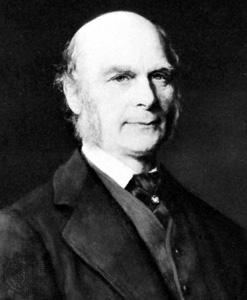 Sir Francis Galton
Sir Francis Galton  Alfred Binet
Alfred Binet
The science of testing an individual's intelligence has always been one mired in controversy. From questions about the accuracy of these tests to questions about their ethics; the task of evluating intelligence has always been treated with some measure of skepticism.The history of IQ began in the ninetheenth century with sir Francis Galton. He was a british scientist known as a dabbler in many different fields, including biology and early forms of psychology. After the shake-up from the 1859 publishing of Charles Darwin's "The Origin of Species", Galton spent the majority of his time trying to discover the relationship between heredity and human ability. He believed that mental traits are based on physical factors.
Galton's ideas on intelligence were influenced also by the work of a Belgian statistician named Lambert Adolphe Jacques Quetelet. Quetelet was the first to apply statistical methods to the study of human characteristics, and actually discovered the concept of normal distribution. However Galton's irrational belief in races with "superior" intellect led to the development of biased and often blatantly unfair tests.
It was a Frenchman named Alfred Binet who in 1904 developed the first objective

intelligence test. Commissioned by the French government to come up with a test to differentiate between children who had an inferior intellect and those who were normal.Binet's test simply put evaluated the average tasks that should be performed by a child of a given age to obtain mental age. This was then divided by the chronological age and multiplied by 100 to get the IQ. This simple formula to date remains the backbone of intelligence testing. Binet's work was brought to America and modified at Stanford University by Lewis M. Terman , and thus the famous "Stanford-Binet" intellegence test was born. The fourth edition of this test the SB-IV is still widely used.
Left:The orignal Binet test
Obviously the IQ test would require the child to read the questions or at least have the questions read to him/her. A large number of children who have never been to school or who are illiterate therefore cannot be evaluated by the Binet tests. In order to overcome this difficulty the Wechsler Intelligence tests were developed. The Wechsler Intelligence Scale for Children (WISC), developed by David Wechsler, is an intelligence test for children between the ages of 6 and 16 inclusive that can be completed without reading or writing.The WISC was originally developed as a downward extension of the Wechsler Adult Intelligence Scale in 1949. A revised edition (WISC-R) in 1974 as the WISC-R, and the third edition, the WISC-III in 1991. The current version, the WISC-IV, was produced in 2003. While there is no doubt that the testing of IQ can help detect early signs of intellectual disability their accuracy in judging how smart a child is remains questionable. The tests also have an element of bias. All tests retain an element of cultural knowledge. An Indian child may not know what a snowman is or what blueberry pie tastes like, not because he/she is dull, but for the obvious reason that he/she has very little chance of having seen either. It is for this reason that several IQ tests have been developed specifically keeping in mind the Indian population.
The Standford-Binet test has been adapted for an Indian population by Kamath in 1940 and is known as the Binet-Kamath Test. One of the critisisms of this test however has been that the test provides tasks that are too easy and therefore do not accurately measure IQ. The Bhatia IQ test is another widely used IQ test for Indian children Most intelligence tests are designed to provide an I.Q. (intelligence quotient) score. The mental age is based on a set of norms that have been devised by collecting data on a fairly large sample of children of different ages, whom the test makers believe are representative of a population at large.
One of the criticisms of I.Q. tests is that most tests are not truly representative, especially regarding lower income and minotiry groups. Even if I.Q. tests are truly representative, they have some drawbacks. Foremost, traditional psychometric tests of intelligence are based on the proposition that human beings are endowed with a single, "general faculty" for acquiring information. Secondly, as a person is given a fixed I.Q. score, his/her intelligence is taken to be a fixed, unchanging entity. Traditional tests of intelligence do not take situational and contextual information into account. Thirdly, they penalise a child for a creative or unconventional answer.
In conclusion we can say that the testing of intelligence is only a tool for the diagnosis of intellectual disability. Using these tests to evaluate the brilliance of the child is not only unfair, but also most probably inaccurate.











No comments:
Post a Comment